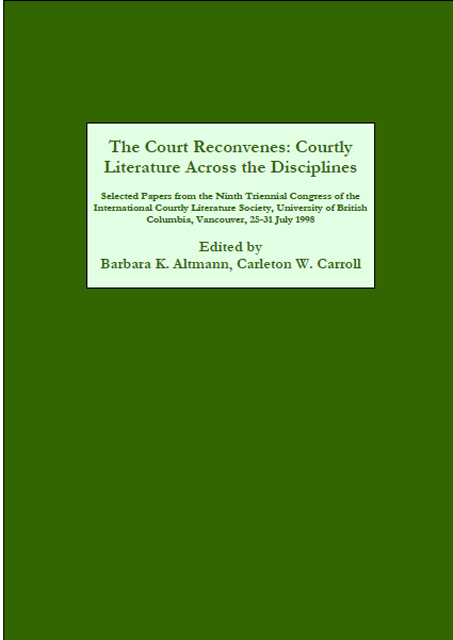 The Court Reconvenes
The Court Reconvenes Songs by Women and Women’s Songs: How Useful is the Concept of Register?
Published online by Cambridge University Press: 31 March 2023
Summary
In 1969, Pierre Bec introduced his definition of the two main registers that he believed characterized medieval French lyric, the registre aristocratisant and the registre popularisant. He preferred his own bipartition to those proposed by earlier scholars, because his was based neither on theme nor on origins, but rather on formal analysis of the poems. In 1972, Zumthor cited Bec's scheme approvingly while nevertheless proposing his own set of registers, the requête d’amour and the bonne vie (251). Bec republished his scheme in 1974 and again in 1977 (1: 33–43), noting the similarity to Zumthor's which, however, he considered less all-encompassing than his own in that it seemed to exclude certain genres, e.g. the chanson de toile (33, n. 36).
Zumthor had admitted that his own scheme was far from perfect, for if the requête d’amour could be defined on the basis of the characteristics specific to the grand chant courtois (i.e., troubadour lyric), the bonne vie was much less homogenous because by the thirteenth century, the period from which most of the extant examples date, it had already assimilated many elements from the first register:
Le registre de la bonne vie apparaît en état plus ou moins accentué de dégradation, imprégné d’éléments hétérogènes, ou porté par des tendances expressives contradictoires… . Souvent, c’est moins comme une cohérence expressive que nous percevons ce registre, que comme un ensemble complexe de débris. (254)
Zumthor articulated clearly his discomfort with a scheme based on register alone by proposing to classify the extant chansons in a way that cut across registral boundaries. He distinguished three groups of texts according to whether or not they presented (1) chanson form with the register of the bonne vie; (2) a form other than that of the chanson with the register of the requête d’amour; and (3) chanson form with indeterminate nonregistral content, e.g. the chansons bachiques (255–56). His detailed discussion of the various genres as they relate to register effectively highlighted the problem of interférences registrales, a difficulty Bec sought to resolve in part by proposing a set of opposing terms (aristocratisant/popularisant) that used a suffix indicating tendencies rather then the clear-cut categories implied by a dichotomy such as savant/populaire.
- Type
- Chapter
- Information
- The Court ReconvenesCourtly Literature across the Disciplines: Selected Papers from the Ninth Triennial Congress of the International Courtly Literature Society, University of British Columbia, Vancouver, 25-31 July 1998, pp. 117 - 124Publisher: Boydell & BrewerPrint publication year: 2002


